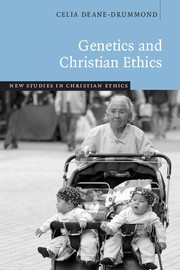Book contents
- Frontmatter
- Contents
- General Editor's preface
- Acknowledgments
- Introduction
- 1 A recovery of virtue for the ethics of genetics
- 2 Theological principles
- 3 Living in the shadow of eugenics
- 4 Genetic testing and screening
- 5 Genetic counselling
- 6 Gene therapies
- 7 Gene patenting
- 8 Women and genetic technologies
- 9 Genetics and environmental concern
- Postscript: Concluding remarks
- Bibliography
- Index
3 - Living in the shadow of eugenics
Published online by Cambridge University Press: 05 June 2012
- Frontmatter
- Contents
- General Editor's preface
- Acknowledgments
- Introduction
- 1 A recovery of virtue for the ethics of genetics
- 2 Theological principles
- 3 Living in the shadow of eugenics
- 4 Genetic testing and screening
- 5 Genetic counselling
- 6 Gene therapies
- 7 Gene patenting
- 8 Women and genetic technologies
- 9 Genetics and environmental concern
- Postscript: Concluding remarks
- Bibliography
- Index
Summary
Exploration of eugenics in the twenty-first century inevitably brings with it a memory of the horrors of eugenics at its worst expressed in the racist practices of Nazi Germany. Eugenics in this regime was predominantly negative, the prevention of birth or even the active killing of those considered ‘undesirable’. What was at stake was the quality of the ‘genetic stock’ of the human race. Less well known is the fact that an alternative eugenic also exists, one that has implications for discussions about genetic therapy, namely the encouragement of reproduction of those judged as ‘favourable’. Historically, those who supported eugenics in its various formulations came from a wide range of political and cultural backgrounds, with the shaping of eugenic policy reflected in the light of those framings. The seeming biological support for certain views of what might be desirable or not represents a fascinating case study in the way science is perceived or used in order to bolster political ideologies and practice. Exploring the more negative aspects of eugenic policy is not a comfortable exercise. One might say that it is genetics in the absence of Christian ethics, or indeed any ethics. Yet those who supported eugenic trends often did so for what they mistakenly presumed were thoroughly altruistic and noble reasons. Women were prominent in the eugenic movements both in North America and across Europe.
- Type
- Chapter
- Information
- Genetics and Christian Ethics , pp. 55 - 75Publisher: Cambridge University PressPrint publication year: 2005

